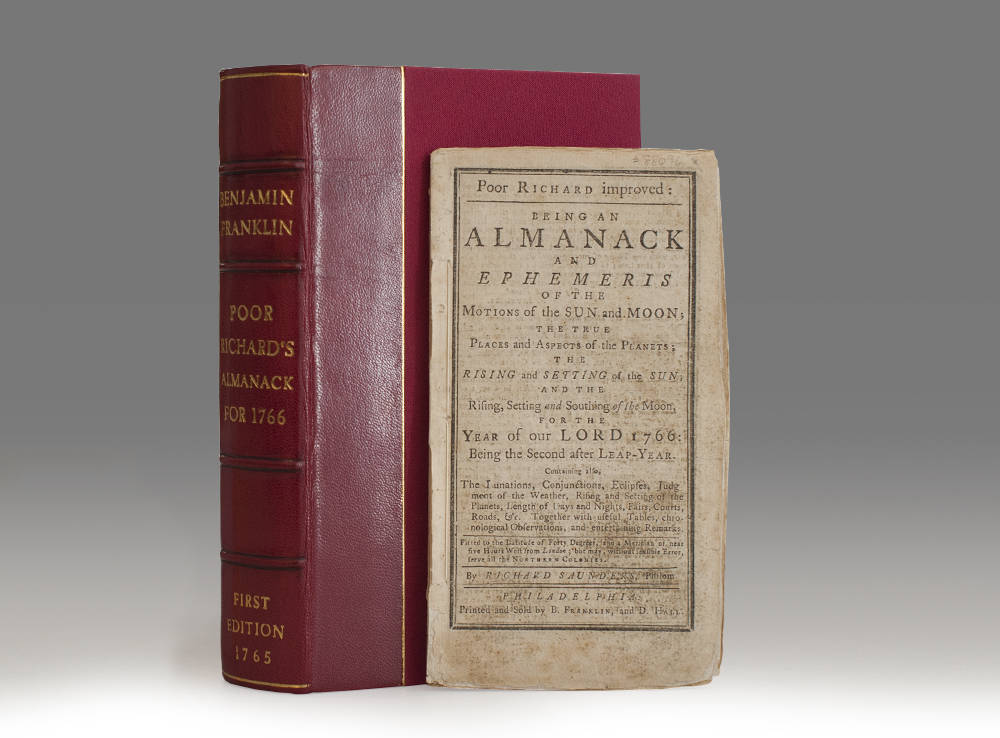Description
“AMERICAN REVOLUTION BEGAN… WITH RESISTANCE TO THE STAMP ACT”: RARE FIRST EDITION OF FRANKLIN’S LAST POOR RICHARD, 1765, CONTAINING THE TEXT OF THE INCENDIARY STAMP ACT
(STAMP ACT) (FRANKLIN, Benjamin). Poor Richard Improved: Being an Almanack and Ephemeris of the Motions of the Sun and Moon… For the Year of our Lord 1766… Philadelphia: Printed and Sold by B. Franklin and D. Hall, (1765). 12mo (3-1/2 by 6-1/2 inches), original printed self-wrappers, renewed stitching, uncut; pp. (36). Housed in a custom cloth chemise and clamshell box.
First edition of the last Poor Richard to be printed and published by Benjamin Franklin and David Hall, issued in late 1765 for the year 1766, containing the text of the notorious Stamp Act, with the famed woodcut of anatomical man “govern’d” by constellations and 12 woodcut-engraved panels. Rarely found complete and uncut.
In 1732 Benjamin Franklin first issued his Poor Richard’s Almanack, a series that “is beyond question the most famous of almanacs” (Ford, 11). “For more than 200 years Poor Richard’s has been an American classic… Historians and biographers often ranked the almanacs with the famous autobiography as a source for Franklin’s life and thought” (Complete Poor Richard’s, v-vi.). By the mid 1760s, amidst colonial fury over passage of the Sugar Act and the incendiary Stamp Act, this issue of Franklin’s Almanack for the year 1766 marked another turning point in becoming “the last year in which Franklin’s imprint appears… The famous Stamp Act, passed by Parliament to take effect June 1, 1765, is here given in full [2-4]” (Church 1052). The Stamp Act especially angered colonial printers such as Franklin’s partner David Hall, who did not advertise, as was his habit, this Almanack in the fall of 1765—likely due to “the turmoil over the Stamp Act” (Miller 851). Franklin, who once urged conciliation between enraged Americans and the punitive Parliament, increasingly warned that the Stamp Act would ultimately lay “the foundation of a future total separation… On February 13, 1766, Franklin got the chance to present his case to Parliament… In one afternoon of highly charged testimony, he would turn himself into the foremost spokesman for the American cause… [and] displayed, with steely words cloaked in velvet, both reason and resolve.” If Parliament sent troops to compel enforcement, Franklin noted: “They will not find a rebellion; they may indeed make one” (Isaacson, 228-31). Franklin’s brilliant defense of the colonies directly affected Britain’s repeal of the Stamp Act, but by then, colonial rebellion could not be undone. It is not too much to say that the “American Revolution began…. with resistance to the Stamp Act” (Smith I:257). Like other colonial almanacs, Franklin’s were “compact little wonders, they were printed on cheap paper and had no real binding. They were meant for daily use, and surviving examples are often… torn apart” (Chaplin, 62). While Franklin, after 1748, was no longer involved in the routine operations of his and Hall’s busy printing concern, the historical record, Franklin scholarship and bibliographic authorities clearly note that his over-arching authorship role of the almanacs continued, along with the opportune supervision of their printing. After this issue, Poor Richard’s “was continued by Hall and Sellars” (Sabin 25567). Containing an extract from “Mr. Anderson’s History,” a guide for raising hemp, aphorisms, eclipses, notice of Quaker meetings, court calendars and more. With woodcut “Anatomy of Man’s Body as govern’d by the Twelve Constellations” and woodcut headpieces for each of the 12 months. Miller 852. Evans 10161. Sabin 25567. Hildeburn 2166. See Church 1052, 1054.
Text professionally cleaned, with stitching renewed. A few edge tears professionally mended with tissue. One leaf with minor marginal trim not affecting text. A near-fine copy of an American classic, unusual to find complete.



